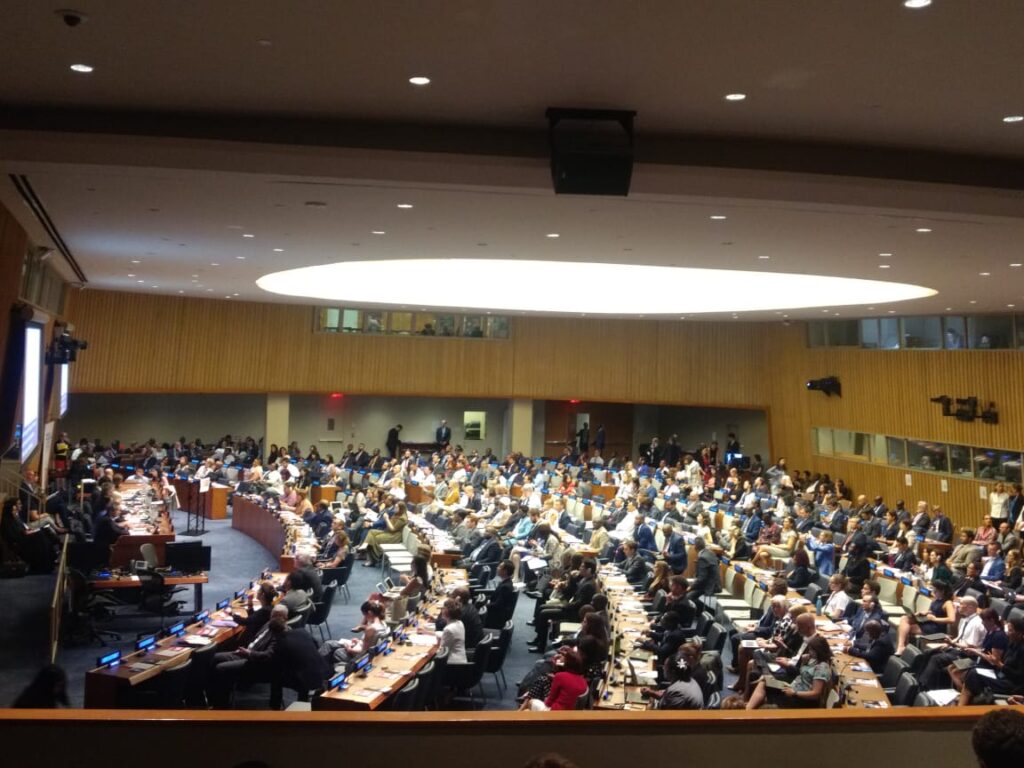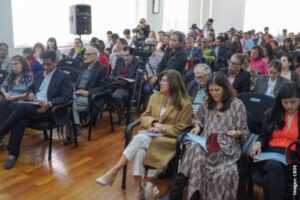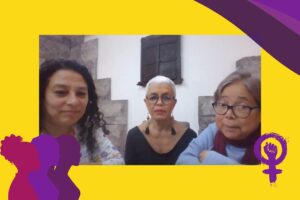At the UN High-Level Political Forum, the platform to follow up SDGs across the world, Chile and Guatemala presented their voluntary national reviews about the implementation of this agenda. Four countries from Latin America and the Caribbean volunteered to participate in the 2019 review, reporting the actions taken for the achievement of the SDGs: Chile, Guatemala, Brazil and El Salvador. However, on the eve of the High-Level Political Forum, the last two countries announced that they would not participate in the review.
Read more: Brazil does not participate in the SDG 4 review at the UN
Members of Campaña Latinoamericana por el Derecho a la Educación (CLADE) (Latin American Campaign for the Right to Education): Foro por el Derecho a la Educación Pública de Chile (Forum for the Right to Public Education of Chile), Colectivo de Educación para Todas y Todos de Guatemala (Education For All Collective Of Guatemala) and Red de Educación Popular entre Mujeres de América Latina y el Caribe (REPEM) (Popular Education Network of Women from Latin America and the Caribbean), attended and followed this review. Other civil society organizations, among them, members of the Education and Academia Group, and the Women’s Major Group, coordinated actions for the inclusion of their government inquiries in the comments to be presented by civil society representatives during the session, who had barely four minutes to ask questions to the States that presented their voluntary reports.
During the first half of the session held on Monday July 15, the States of Azerbaijan, Chile, Philippines and Sierra Leone presented their voluntary reports subsequently giving the floor to representatives from other States and civil society, for questions and comments. Civil society representatives had only four minutes to pose questions to the four countries.
During the second half of the session, Guatemala, Indonesia and Turkey presented their reports. Soon afterwards, other States posed questions and civil society was given only two minutes to address the three countries at one time.
Chile’s Review
In her presentation, the Assistant Secretary of Social Assessment of the Ministry of Social Development and Family of Chile, Alejandra Candia Díaz, underscored the following actions taken by the Chilean State for the advancement of SDG 4: the elaboration of a national childhood plan; and measures to guarantee quality education, to modernize professional-vocational training, to move forward in early childhood education and eradicate child labor.
Likewise, she highlighted the development of a National Human Rights Plan, Plan Compromiso País “No dejar nadie atrás” (National Commitment Plan: “No one left behind”) and the government’s support of public-private partnerships and the coordination between the private sector, civil society and the academy to face climate change and promote sustainable development.
>> Chile’s Official Report (In Spanish)
Representatives of the Major Groups for Children and Youth, Indigenous Peoples and Women, in dialogue with the Education and Academia Major Group, immediately posed questions about the criminalization of students in Chile, particularly in view of the Aula Segura (Safe Classroom) Law that allows the expulsion from education centers of students who mobilize for the defense of their rights; other questions were posed about the lack of priority given to public education financing; the implementation and monitoring of the National Human Rights Plan; the guaranteed inclusion of Sexual and Reproductive Education in school curricula to reduce girls’ pregnancy; and the elimination of a gender-sensitive program from the Ministry of Health.
In response to these questions, the Chilean representative claimed that the State has worked in collaboration with civil society to develop the National Human Rights Plan and that progress has been made to confront violence against women through Plan Compromiso País. On top of this, she added that teenage pregnancy rates have fallen in Chile, which reveals progress in this area. However, the rest of the questions remained unanswered, particularly those related to students’ criminalization, public education financing and progress reversed in terms of sexual and reproduction education, and gender equality policies. She did not answer either another question from the Canadian representative, on the measures that are being implemented to include girls in secondary education.
Foro por el Derecho a la Educación Pública de Chile exerted pressure, through social media, to obtain concrete government responses to these questions. Likewise, the spotlight report prepared about SDG 4 status in the country is being disseminated.
In this document, the following issues were raised as barriers for the realization of the human right to education: criminalization of students and teachers who mobilize to defend their rights; the persecution of students and critical thinking at schools, through the Aula Segura law; the financial contributions of the State to private schools, detrimental to the right to public and free education; the Admisión Justa (Fair Admission) project and its negative impact in terms of segregation and a wider inequality gap between students and education centers; changes in secondary education curricula, removing Philosophy, History, Physical Education and Arts from the mandatory content, keeping Religion; and the absence of comprehensive sexual education policies.
>> Spotlight Report presented by Foro por el Derecho a la Educación Pública de Chile (In Spanish)
>> Read more: Civil society reports to the militarization and demise of public education in Chile (In Spanish)
Guatemala’s Review
The Secretary of Planning and Programming of the Administration, Miguel Angel Moir, submitted the voluntary national report of Guatemala. He underscored the coordination sought, at national level, between the SDG implementation and the National Development Plan 2032, where priorities were set for national development in dialogue with different civil society sectors. These are some of the priorities: poverty eradication, security, health, water and sanitation, management of natural resources, employment and education.
He affirmed that the national development plan gives priority to people and their living standards, seeking to promote inclusion and equality. In the education field, he reaffirmed the State commitment to guarantee 12 years of free primary and secondary education for all, with no discrimination, with quality and equity; investment in public education; and the promotion of extended access to secondary and tertiary education.
When the Q&A session opened for States and civil society, the representative from Dominican Republic asked: How are low levels of tax collection overcome and resources guaranteed to achieve SDGs? The Guatemala representative replied that low tax collection in the country is a challenge: tax burden in the country is barely 10% of the Gross Domestic Product (GDP). He listed the following as pending tasks to overcome the situation: break through tax severity, address smuggling and tax dodging, carry out an economic reform and revisit the tax policy.
The State of Guatemala was challenged by the Women’s and Indigenous Major Group regarding the persistence of discrimination against indigenous peoples and women in the country. The representative recognized that the neglect and levels of poverty in indigenous and rural communities are problems that still persist at national level, and that, in fact, social protection policies, the inclusion of indigenous people and addressing discrimination and gender inequality are still emerging issues and must improve.
Colectivo de Educación para Todas y Todos de Guatemala (Education for all Collective of Guatemala) affirms the need to guarantee the rights of girls, women and indigenous people in the report elaborated on the status of SDG 4, within the framework of the High Level Political Forum.
In the document the need to end inequality suffered by girls in their access to education and to guarantee the right of indigenous people to receive education in their mother tongue, was affirmed. Furthermore, it underscores that “Guatemala is still facing systemic poverty, inequality, discrimination, exclusion and high levels of impunity”, and it is necessary to promote tax justice in the country, to achieve adequate and fair financing for public and inclusive education.






